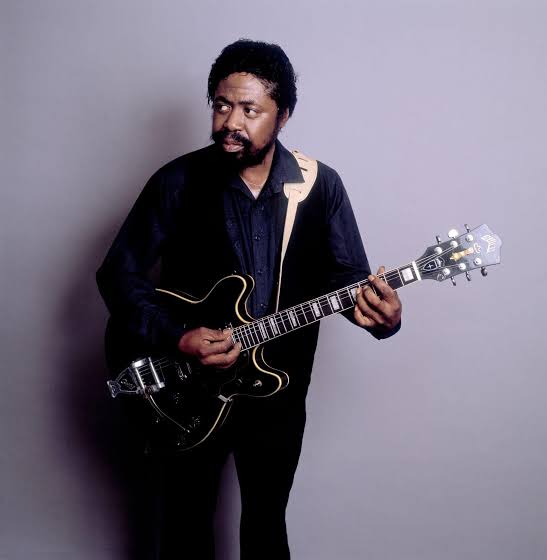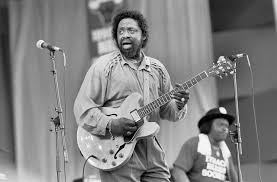The Life and Legacy of Son Seals: A Fiery Force in Modern Blues
Introduction
Son Seals was a powerhouse of electric blues, known for his raw intensity, gritty guitar work, and deeply emotional vocals. Emerging from the deep musical roots of the Mississippi Delta and forging his career in the vibrant Chicago blues scene, Seals left behind a legacy of passionate performances and genre-defining recordings. His life and music reflect the struggles and triumphs of the blues itself—resilient, honest, and electrifying.
Early Life in Arkansas
Frank “Son” Seals was born on August 13, 1942, in Osceola, Arkansas, a small town nestled in the Mississippi Delta. He grew up surrounded by music. His father, Jim Seals, owned the Dipsy Doodle Club, a local juke joint that hosted some of the biggest names in blues and R&B, including B.B. King, Albert King, and Sonny Boy Williamson II. This early exposure gave Son a front-row seat to the legends of the genre and laid the foundation for his musical journey.
By the time he was 13, Seals was playing drums professionally. But it wasn’t long before he picked up the guitar, inspired by the fiery playing of artists like Guitar Slim and Albert King. His guitar playing would later be characterized by a biting tone and emotionally charged phrasing—traits that became his signature style.
Musical Beginnings and Move to Chicago
In his teens and early twenties, Seals played both guitar and drums in various regional bands throughout the South. He worked with artists such as Earl Hooker and Robert Nighthawk, honing his craft in a competitive and creative musical environment.
In 1971, Son Seals moved to Chicago, a city that had become a hub for electric blues. It was there that his career truly took off. His raw talent and compelling stage presence quickly earned him a following. A pivotal moment came when he caught the attention of Bruce Iglauer, the founder of Alligator Records. Impressed by Seals’ intensity and authenticity, Iglauer signed him as one of the label’s first major artists.
Rise to Prominence with Alligator Records
Seals released his debut album, “The Son Seals Blues Band,” in 1973. The album was a critical success, showcasing his aggressive guitar tone, emotionally charged vocals, and original songwriting. It marked the beginning of a fruitful relationship with Alligator Records and cemented his place in the contemporary blues scene.
He followed up with several other acclaimed albums, including:
- “Midnight Son” (1976)
- “Live and Burning” (1978)
- “Chicago Fire” (1980)
- “Bad Axe” (1984)
Each record displayed Seals’ evolving sound—balancing tradition with innovation, combining heartfelt lyrics with fierce guitar solos. His live performances, often filled with sweat, soul, and searing solos, earned him a reputation as one of the most electrifying bluesmen of his time.
Personal Struggles and Perseverance
Son Seals’ life was marked by both triumph and tragedy. He endured numerous personal challenges, including the tragic loss of his leg due to complications from diabetes. In 1997, he was also the victim of a shooting by a former girlfriend, but he miraculously survived. Despite these setbacks, Seals continued to perform, recording and touring internationally.
His ability to channel personal pain into his music gave his performances even more emotional weight. Seals never let adversity silence his voice—instead, it made his music even more authentic and powerful.
Later Career and Legacy
In the 1990s and early 2000s, Son Seals continued to release music and tour. His 1996 album “Live – Spontaneous Combustion” received high praise, and in 2000, he released “Lettin’ Go,” his final studio album with Alligator Records.
He also collaborated with other major blues and rock artists. In 1999, he performed with The Smashing Pumpkins, showcasing his influence beyond the blues community.
Son Seals passed away on December 20, 2004, in Chicago, at the age of 62, after a long battle with diabetes. His death was mourned throughout the blues world, but his music lives on through his recordings and the many artists he influenced.
Influence and Recognition
Son Seals is widely regarded as one of the most important electric blues guitarists of the post-Muddy Waters era. His influence can be heard in generations of blues and rock musicians who admire his unfiltered passion and fearless guitar playing.
He was posthumously inducted into the Blues Hall of Fame in 2009, a testament to his enduring impact on the genre.
Conclusion
Son Seals embodied the essence of the blues: honesty, grit, pain, and triumph. His music continues to resonate with audiences around the world, reminding listeners of the power of expression through hardship. As a pioneering figure in modern blues, his legacy remains as fierce and uncompromising as his guitar solos.


Comments are closed